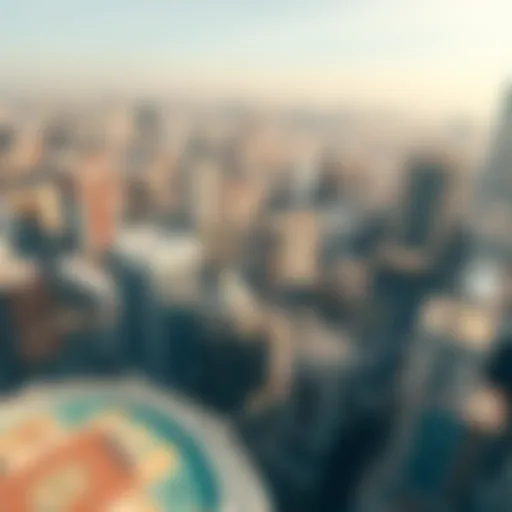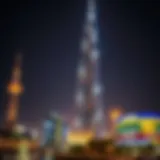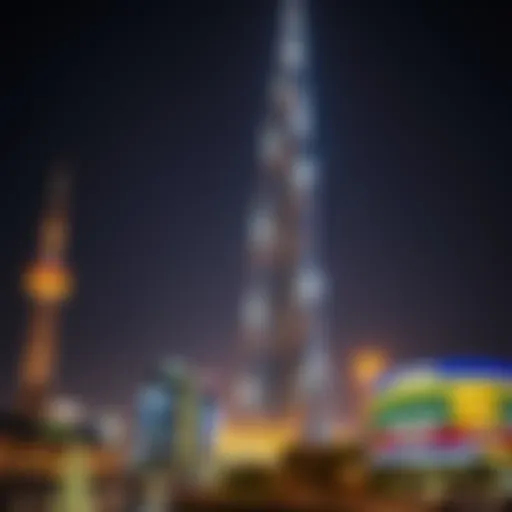Ramadan Schedule in Dubai: Insights for 2023
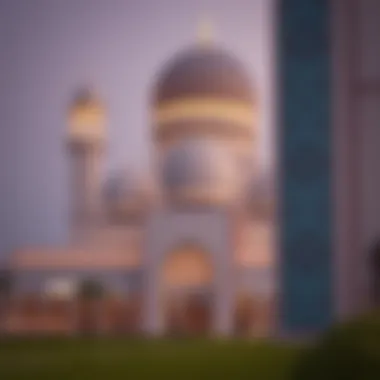

Intro
As the crescent moon appears, marking the beginning of Ramadan, Dubai transforms into a city rich in spirituality and cultural fervor. For many, this month represents more than just a period of fasting; it embodies community, reflection, and devotion. Understanding how Ramadan unfolds within this bustling metropolis is crucial for locals and visitors alike. This exploration digs into not just the prayers and fasting timings, but also how daily life, business dynamics, and the real estate market undergo notable shifts during this holy period.
Navigating Dubai during Ramadan is distinct from any other time of the year. From altered business hours to specific cultural practices, the city hums with a different rhythm. Investors, homebuyers, and expats particularly need to grasp these nuances, especially if they are anticipating interactions in the property market. As we unravel the layers of Ramadan in Dubai for 2023, the nuances and implications for daily life and the real estate landscape will be laid bare.
Market Insights
Current Trends in Dubai Real Estate
As Ramadan dawns upon Dubai, the real estate market begins to exhibit unique trends. Historically, this period often witnesses a slowdown. Many tenants and buyers typically stall their decisions, preferring to delay any significant commitments until after Eid al-Fitr. However, it's essential to note that the market might exhibit pockets of activity, particularly for those looking at investment opportunities.
High-quality properties, especially those that align with family-oriented living, remain in demand. With expatriates and retirees searching for more space or amenities that cater to their lifestyle during Ramadan, the demand for villas and larger apartments sees a subtle uptick.
- Increased interest in community-centered developments
- Families seeking proximity to mosques or family-friendly facilities
- Rise in short-term leasing options for newcomers
Price Fluctuations and Forecasts
The real estate prices in Dubai often reflect cultural sentiments during Ramadan. Interestingly, there's a historical pattern where property prices stabilize or even dip slightly, allowing savvy investors to capitalize on favorable buying conditions. That said, areas such as Dubai Marina and Downtown have shown resiliency in maintaining their value.
Given the expected influx of visitors during the Eid celebrations, short-term rental prices might see a seasoned jump post-Ramadan. Investors who understand these cycles know that timing their purchases around Ramadan can yield fruitful returns. It's a dance of patience and insight — recognizing when to hold back and when to leap forward is key.
"In the shadows of the tall buildings, many are not just looking for homes, but a slice of community and connection during Ramadan."
Property Buying Guides
Steps to Buy Property in Dubai
Jumping into the property market during this unique time of the year necessitates a clear understanding of the buying process. Here are some foundational steps to ensure a smooth journey:
- Research Available Properties: Start by browsing listings that align with your needs during Ramadan. Look into community features, amenities, and proximity to mosques.
- Secure Financing: Consult with banks or financing institutions about mortgage options. Given Ramadan's implications, lenders may have specific protocols during this month, so ensuring your finances are in order is critical.
- Engage a Real Estate Agent: A knowledgeable agent, particularly one familiar with the implications of Ramadan, can offer valuable insights and guide you through the intricacies of property purchasing.
- Negotiate Terms: With the market experiencing a slight shift, don't hesitate to negotiate pricing or additional terms that might benefit you in the long run.
- Complete Legal Requirements: Ensure that all paperwork is in order. During Ramadan, some transactions might experience delays due to adjusted working hours, so it’s best to stay ahead.
Legal Considerations for Buyers
Being informed about legal frameworks is non-negotiable before diving into property purchases in Dubai. Key considerations include:
- Document Verification: Always verify the legitimacy of property documents; this is especially pertinent during the Ramadan season when transactions might be hurried.
- Understanding Title Deeds: Familiarize yourself with the title deeds and ensure they are free from encumbrances.
- Consulting a Lawyer: If needed, seeking legal advice can save many headaches, ensuring your interests are safeguarded as you navigate through your purchase.
As we move deeper into Ramadan, understanding its implications is not just beneficial; it is essential for those ready to seize opportunities in Dubai's real estate market.
Understanding Ramadan
Ramadan is not just a month on the calendar; it’s a cornerstone of Islamic faith and practice. In the context of Dubai and its diverse population, understanding Ramadan is crucial for both Muslims and non-Muslims alike. This holy month signifies a time of reflection, spiritual growth, and community bonding. However, what makes Ramadan truly unique is how it influences nearly every facet of daily life in this bustling city.
From the sounds of prayer calls punctuating the day to the vibrant cultural events that spring up around the month, Ramadan creates an atmosphere unlike any other. For those navigating daily routines, especially investors, expats, and real estate professionals, appreciating the rhythms of Ramadan can offer significant insights. It can inform business strategies, enhance community engagement, and foster deeper connections with those around.
Historical Background of Ramadan
The roots of Ramadan run deep within Islamic tradition, tracing back to the time of the Prophet Muhammad. The first revelation of the Quran occurred during this month, in what is called Laylat al-Qadr or the Night of Decree. Over the centuries, Ramadan has evolved into a time not only of fasting from dawn till dusk but also a period for communal prayers, reflection, and increased devotion.
The history surrounding Ramadan is replete with stories of perseverance and faith. It is said that the early Muslims faced various challenges during their observance. This historical context imbues the month with a sense of unity among Muslims worldwide, as they remember not only the spiritual significance but also the sacrifices made by their forebears.
"Fasting is a shield. It protects against sins and encourages self-discipline."
Religious Significance of Ramadan
Ramadan serves as an avenue for spiritual rejuvenation. Fasting during this month is one of the Five Pillars of Islam, which underscores its importance. The essence of fasting extends beyond refraining from food and drink; it's about clearing the mind and focusing on spiritual growth. Muslims are encouraged to engage in frequent prayers, Quranic recitation, and charitable acts throughout the month.
The nightly prayers known as Taraweeh become a communal affair, reinforcing social bonds and shared faith. This collective experience nurtures a sense of belonging, making it essential for anyone looking to understand the cultural and religious tapestry of Dubai.
Overall, appreciating these layers of meaning within Ramadan equips residents and visitors alike with a richer perspective on the city’s culture and dynamics. Without a firm grasp of its significance, one might miss the profound beauty in this time of year, where belief, practice, and community intertwine.
Ramadan Schedule Overview for
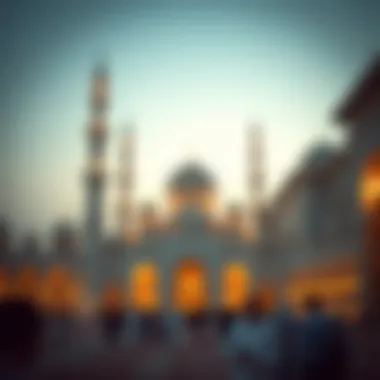

The Ramadan Schedule Overview holds significant value for both residents and visitors in Dubai, as it encapsulates the essence of the holy month. Knowing the schedule not only aids Muslims in fulfilling their spiritual obligations but also supports non-Muslims in understanding and respecting the customs that define this time. The month-long observance is rich with cultural and religious importance, and grasping the timing of various activities allows everyone to engage in the shared community spirit.
Understanding the schedule can help investors and homebuyers plan their commitments wisely. Through the lens of fasting, prayer, and community, the economic landscape shifts, creating windows for unique opportunities. As various businesses adapt their hours and social behavior trends emerge, being aware of the timeline allows stakeholders to navigate these fluctuations more adeptly. Whether it's planning meetings, attending community events, or participating in Iftar gatherings, having a clear grasp of the day's structure can influence decisions greatly.
Dates of Ramadan in
For 2023, Ramadan is expected to commence on the evening of March 23 and conclude on April 21, subject to the sighting of the moon. The exact dates may vary based on lunar observations, which could cause shifts in daily activities, including work schedules and school timings. Here’s a breakdown of key dates during Ramadan:
- Start: Evening of March 23, 2023
- Mid-Ramadan: Around April 6, 2023
- End: Evening of April 21, 2023
- Eid al-Fitr: Expected on April 21 or 22, marking the end of Ramadan
With these dates in mind, individuals and businesses alike can prepare ahead of time, ensuring they accommodate fasting hours and related events seamlessly.
Daily Prayer Timings
As daylight dawns and dusk descends, prayer timings take on heightened significance during Ramadan. The days are segmented into five primary prayer slots, with specific attention devoted to the pre-dawn and sunset prayers that coincide with fasting breaks. In Dubai, the general timings are as follows, though these can shift slightly throughout the month:
- Fajr (Pre-Dawn): Approximately 4:30 AM
- Dhuhr (Noon): Around 12:30 PM
- Asr (Afternoon): About 3:45 PM
- Maghrib (Sunset): Roughly 6:45 PM
- Isha (Night): Near 8:00 PM
It's not unusual for mosques throughout Dubai to announce these timings, enhancing accessibility for worshippers. Additionally, mobile apps and community notices often keep residents updated on any changes or timings specific to their neighborhoods.
The rhythm of prayer unifies the community, creating a cadence that marks the life of the city during Ramadan.
Fasting Practices During Ramadan
Fasting during Ramadan is not just an act of abstaining from food and drink; it’s a profound practice steeped in spirituality and discipline. The significance of fasting during this holy month extends beyond the physical act itself—it serves as a medium for self-reflection, community bonding, and spiritual growth. In this section, we'll explore the intricacies of fasting practices in Dubai, emphasizing how they mold the essence of Ramadan for individuals and communities alike.
Pre-Dawn Meals (Suhoor)
Suhoor, the meal consumed before dawn, acts as a vital fuel for Muslims embarking on the day of fasting. It’s not merely routine but an essential ritual that prepares the body for a full day without sustenance. The food consumed during Suhoor should ideally be rich in nutrients, offering energy and hydration. Staple choices include whole grains, fruits, and proteins.
- Hydration: Staying hydrated is crucial. Many include dates and water or yogurt in their Suhoor.
- Nutritional Balance: A balanced meal should comprise approximately 50% carbohydrates, 30% protein, and 20% healthy fats.
The atmosphere during Suhoor is quite unique. Families often gather for this meal, fostering a sense of unity. It’s a time to reflect on the day ahead and share intentions for the fasting period. It’s also an opportunity to discuss plans or community events, aligning with the communal spirit of Ramadan.
Breaking the Fast (Iftar)
Iftar marks the end of the daily fast and is one of the most anticipated moments during Ramadan. The tradition is rich and celebratory, often beginning with the consumption of dates and water, following the Prophet Muhammad's practice. This initial refresh engages the digestive system gently, preparing it for a full meal.
The meals served during Iftar vary widely, reflecting the cultural diversity of Dubai. Here are key elements often found on Iftar tables:
- Dates and Water: A consistent staple that holds both historic and nutritional value.
- Soups and Salads: Many start with light options to ease into the meal.
- Main Dishes: Commonly enjoyed dishes include biryani, grilled meats, and a variety of regional specialties.
- Sweets: A rich assortment of desserts such as kunafa or baklava typically concludes the meal, satisfying the sweet tooth after a day of fasting.
- Cultural Influence: Dubai's multicultural environment means Iftar can range from traditional Emirati foods to international cuisines.
Community Iftar events become significant during this time. Parks, mosques, and community centers often host these gatherings, demonstrating solidarity and compassion. It reinforces communal ties and provides an opportunity for sharing among various social groups, highlighting the essence of Ramadan as a time for giving and togetherness.
Fasting practices in Dubai during Ramadan encapsulate the balance between personal discipline and communal engagement, shaping the social fabric of the city and contributing to a deeper understanding of spiritual resilience.
"Fasting is not about abstaining from food, but nurturing one's character and spirit."
For a deeper insight into Ramadan fasting, visit Britannica.
For information on community events and shared Iftar gatherings, consider checking local resources or social media platforms like Facebook or Reddit.
Cultural and Social Aspects of Ramadan in Dubai
The cultural and social dimensions of Ramadan in Dubai are not just important; they form the very fabric of the community's identity during this sacred period. Ramadan is viewed as a time for spiritual reflection, community bonding, and philanthropy. This observance resonates deeply among Emiratis and expatriates alike, offering a unique blend of traditions that encapsulate the essence of living in a cosmopolitan city influenced by diverse cultures.
Community Iftar Events
During Ramadan, the spirit of sharing and togetherness is palpable through various community Iftar events. These gatherings are more than just meals to break the fast; they symbolize a collective embrace of unity among different cultures and faiths.
Iftar in a community setting often takes place in parks, mosques, and community centers, transforming public spaces into lively hubs of activity. Families, friends, and even strangers come together to enjoy dates, water, and an array of dishes that reflect the culinary influences of the many cultures represented in Dubai.
- Popular Community Iftar Locations
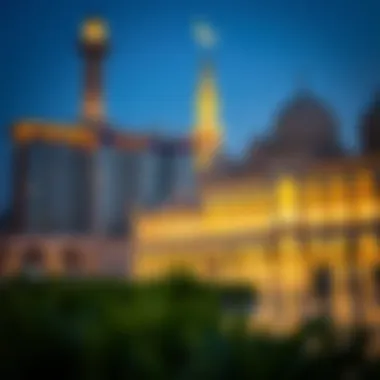

- Dubai Marina
- Al Seef District
- Jumeirah Beach Park
Despite individual differences, the communal tables represent a tapestry of diversity, accompanied by laughter and shared stories. Many local businesses and hotels also host Iftar events, offering affordable meals to those who may not have the means to prepare their own, ensuring that no one breaks their fast alone. Such initiatives foster goodwill and collaboration, creating an atmosphere of partnership rather than competition.
"The act of breaking bread together is a reminder of shared humanity, transcending boundaries and inviting friendship throughout the community."
Charitable Giving During Ramadan
Charity is intrinsically woven into the fabric of Ramadan practices, with donating to those in need seen not just as a virtue but as a communal responsibility. Known locally as Zakat, giving is particularly emphasized during the holy month, with many individuals and organizations encouraging contributions to local food banks, orphanages, and health care facilities.
In Dubai, various initiatives emerge that aim to serve the underprivileged. Fundraisers often spring up in neighborhoods, with donations collected through both food drives and financial contributions.
- Common Charitable Initiatives Include:
- Providing meals for the less fortunate
- Supporting orphan sponsorship programs
- Health services offered at reduced or no cost
Additionally, social media platforms like Facebook and Instagram serve as effective channels for promoting charitable campaigns, making it easier for community members to participate in philanthropic activities.
The act of giving during Ramadan not only touches lives in visible ways, but also enriches one’s spiritual journey, reinforcing the values of empathy and compassion.
Through community events and acts of charity, Ramadan in Dubai transforms into a powerful reminder of the importance of connection—both to one another and to the greater world around us.
Impact of Ramadan on Business Operations
Ramadan is more than a month of fasting; it significantly shapes Dubai's economic landscape. As businesses navigate the unique dynamics of this holy month, understanding its implications becomes crucial for anyone involved in the local market—from investors and developers to residents and expatriates.
Changes in Business Hours
During Ramadan, Dubai's business hours shift as dramatically as the sun setting on a hot summer day. Many companies adopt shorter working hours, which can create confusion but is essential to accommodate the fasting practices of employees. Typical adjustments might see office hours reduced, often starting later in the day and ending around 3 PM to 5 PM. Food establishments, notably, might close during daylight but extend their hours into the night, catering to the crowds breaking their fast.
"It's like a dance of schedules. Everyone is in sync with iftar times, adjusting routines to fit the rhythm of Ramadan."
In the retail sector, many malls and shops may open later in the evening, allowing shoppers to visit post-iftar. Those in real estate see a different trend—open houses and viewings become more strategic, taking place in the evening rather than during the day. This shift highlights the flexibility needed for businesses to cater to their customers’ needs during this special time.
Consumer Behavior During Ramadan
Consumer behavior takes a notable turn during Ramadan. The month ushers in a change in purchasing patterns, reflective of the spirit of giving and community focus. With a surge in demand for certain products, businesses often adjust their inventory to include more food items, especially those suitable for iftar and suhoor meals.
Sales of dates, snacks, and sugary drinks typically see a boost, while restaurants often offer special iftar buffets that lure both locals and tourists. This seasonal spike means companies need to plan marketing strategies ahead of Ramadan to capitalize on these consumer habits.
On the flip side, some may witness a dip in non-essential goods sales, as people prioritize their budgets around food and seasonal festivities. Ultimately, understanding these behaviors helps businesses not only to adapt but also to thrive. It's important for investors and realtors to recognize these cycles as they plan their strategies in the real estate market.
As the month advances, the community spirit grows, and retailers often partake in charitable donations, further aligning their brand with the values promoted during Ramadan. Businesses that cater to this mindset can expect loyalty and trust from consumers.
In essence, Ramadan serves as much more than just a religious observance in Dubai; it forms the backbone of business strategy, driving operations and market behavior in innovative ways.
Ramadan in the Real Estate Sector
The relationship between Ramadan and the real estate sector in Dubai reveals unique insights. This holy month not only affects cultural practices but also shapes the landscape of property transactions, investments, and market behavior. As a city that blends modern living with rich traditions, understanding this dynamic can benefit investors, buyers, and realtors. During Ramadan, the property market does not slow down; rather, it finds a rhythm of its own, presenting unique opportunities that can be capitalized on.
Market Trends During Ramadan
The real estate market in Dubai exhibits distinct trends throughout Ramadan. Historical data shows that during this period, there tends to be an uptick in demand for rental properties. This phenomenon can be attributed to several factors:
- Family Gatherings: Many expatriates and locals return to Dubai to be with family for iftars, leading to increased demand for larger family accommodations.
- Seasonal Promotions: Real estate developers often offer incentives such as lower rates or flexible payment plans aimed at attracting tenants during this time.
- Investor Interest: Some investors view Ramadan as an opportune moment to enter the market, while developers may rush to finalize transactions before Eid festivities begin.
In addition, the timeframe surrounding Ramadan sees many buyers looking to purchase property ahead of the Eid celebrations. Transactions may spike in the weeks prior as families aim to secure homes where they can celebrate together. This creates a competitive environment where well-positioned properties can attract swift interest.
Opportunities for Investors
Investors can find a goldmine in the nuances of the Ramadan period. With recreational activities and social gatherings reaching a peak, investing during this month can yield favorable returns. Here’s how:
- Leasing Options: Short-term leases may present opportunities for landlords to charge premium rates during the festive period, capitalizing on increased demand.
- Community Developments: Investors may find it beneficial to focus on properties in community-oriented developments. These areas often see a surge in interest as people prioritize proximity to mosques and communal areas.
- Marketing Strategies: Tailoring marketing efforts during Ramadan can help realtors connect with potential buyers or tenants. Highlighting features such as spacious dining areas for iftar dinners or easy access to prayer facilities can resonate well with the target audience.
"Understanding the nuances of market behavior during Ramadan can provide investors with a competitive edge. The right moves this month can lead to fruitful opportunities."
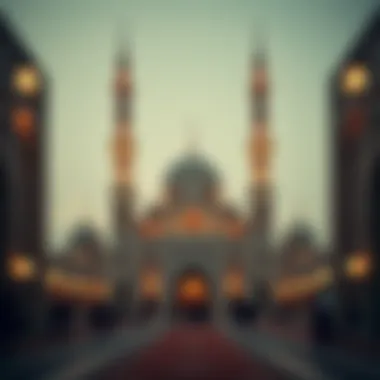

In summary, engaging with the real estate sector during Ramadan is compelling for various reasons. Both investors and purchasers can take advantage of market trends and opportunities unique to this time. Understanding community dynamics and buyer behaviors can lead to strategic investments, fostering growth in one's portfolio while enriching the vibrant tapestry that is Dubai.
Navigating Daily Life in Dubai During Ramadan
In the bustling cityscape of Dubai, navigating daily life during Ramadan requires a keen understanding of the customs and shifts that this holy month brings. This period is not just about fasting from dawn until dusk but involves deep-rooted traditions and community values that shape the pulse of the city. Both residents and visitors need to be aware of the changes in daily routines, as these can significantly impact how life unfolds during this time.
Ramadan offers an opportunity to witness Dubai’s vibrant culture as it transforms into a hub of spirituality and community engagement. Recognizing local customs enables expatriates and travelers to blend in more harmoniously with the rhythm of the city. It’s essential to approach this month with respect and mindfulness, ensuring a positive experience while living in or visiting this diverse environment.
Tips for Non-Muslims
- Be Mindful of Eating and Drinking: During the daylight hours, it’s respectful to abstain from eating, drinking, or smoking in public places. Some areas, like shopping malls or cafés, may have designated spots where you can enjoy refreshments discreetly, but it is best to limit these activities in shared spaces.
- Adjust Your Schedule: Many businesses, including restaurants and shops, may alter their hours, opening later in the day to accommodate fasting schedules. It’s wise to check ahead for operating times to avoid any surprises. Peak times for dining out will often shift to post-Iftar, so plan your meals accordingly.
- Participate in Community Events: If the opportunity arises, attend community Iftar gatherings. These events are not only a great way to connect with local customs but also allow non-Muslims to experience the sense of togetherness and generosity that characterizes Ramadan.
- Respect the Spirit of the Month: Engage with your Muslim friends and colleagues about their practices and what Ramadan means to them. This dialogue fosters understanding and enriches the cultural exchange that is so vital in a global city like Dubai.
"Ramadan is a chance to reflect on personal growth, making it the perfect time for all who wish to embrace the culture to do so respectfully."
Etiquette Considerations
Being mindful of etiquette during Ramadan is pivotal for a respectful and enriching experience in Dubai. Here are some considerations to keep in mind:
- Greeting Practices: Use phrases like "Ramadan Mubarak" or "Ramadan Kareem" when interacting with Muslim friends or colleagues. Such greetings go a long way in showing respect for their beliefs.
- Modest Dress Codes: While casual attire is acceptable in many settings, modesty in clothing is encouraged, especially in public areas and religious sites. Following local dress norms is a sign of courtesy and appreciation for the culture.
- Avoid Public Displays of Affection: During Ramadan, it’s wise to limit public displays of affection, as such behavior is generally frowned upon. Respecting these boundaries reflects understanding and sensitivity toward local customs.
- Noise Levels: As many people observe nighttime prayers or engage in quiet contemplation, keeping noise levels down in public areas after sunset is greatly appreciated.
By understanding these aspects of etiquette, non-Muslims can show their respect and embrace the richness of the Ramadan experience in Dubai, making the month memorable for themselves and for those around them.
Post-Ramadan Celebrations
The culmination of Ramadan, a month characterized by faith and reflection, leads into a vibrant celebration known as Eid al-Fitr. This event holds great significance, not only as a religious observance but also as a celebration of community and culture. Understanding these post-Ramadan festivities is crucial, especially for those who intend to engage with the dynamic environment of Dubai during this time.
Eid al-Fitr serves as a time of joy and gratitude after a month of fasting. Families reunite, friends celebrate, and communities come together to mark the end of a holy period. It’s not merely about feasting but embracing shared values like compassion and generosity.
Eid al-Fitr Festivities
Eid al-Fitr, often referred to as the "Festival of Breaking the Fast", is celebrated with high spirits and communal harmony. The day typically begins with a special prayer at the mosque, called Salat al-Eid, where the community gathers in large numbers. This prayer embodies the unity of the Muslim community and is a profound expression of collective faith. After the prayers, the festivities commence with family gatherings and sumptuous meals.
In Dubai, this celebration has a unique flavor. Many residents and visitors opt to indulge in extravagant brunches at upscale hotels featuring traditional delicacies like biryani, kebabs, and an array of desserts. These meals symbolize abundance and gratitude for the blessings received during Ramadan. Outdoor events, amusement parks, and cultural fairs blossom around the city, reflecting the lively spirit of Eid. Furthermore, it’s a time when benevolent acts are encouraged, with many choosing to give generously to charity, ensuring that the less fortunate also enjoy the season of celebration.
Traditions and Customs
The traditions associated with Eid al-Fitr in Dubai are as rich and diverse as its residents. Before the day arrives, families prepare by purchasing new clothes, traditionally worn for the occasion. It’s seen as a fresh start, marking the end of the Ramadan month. Greeting cards and gifts often find their way into the hearts of loved ones, strengthening familial ties.
Querying the traditions, you will uncover several unique practices that vary among communities:
- Zakat al-Fitr: A charitable contribution made before the Eid prayer, ensuring those in need can partake in the festivities.
- Public Celebrations: Various public spaces organize events which include live performances, art exhibitions, and fireworks, painting the town in festive colors.
- Culinary Traditions: Certain dishes are specifically prepared during Eid, such as sweet pastries like maamoul, filled with dates or nuts, embodying the festive spirit.
The essence of Eid transcends beyond mere celebration; it’s a reflection of solidarity, joy, and a renewed commitment to faith and community values. This festivity acts as a perfect segue from the reflective atmosphere of Ramadan into a season of joy and connection, setting a positive tone for the months to come.
The unity and celebration during Eid al-Fitr not only strengthen communal bonds but also weave the fabric of Dubai’s diverse culture.
Those interested in navigating the real estate landscape post-Ramadan would find these celebrations essential, as they often reflect broader societal sentiments which can influence market dynamics in the wake of festive spending and cultural engagement.
For deeper insights into Ramadan and cultural traditions, you may consider referencing Wikipedia or explore further Britannica's offerings.
Final Thoughts on Ramadan in Dubai
As the month of Ramadan draws to a close, it’s essential to reflect on the significant impact this time has on the fabric of Dubai’s society and economy. In this bustling city known for its glitz and innovation, Ramadan serves as a crucial period of spiritual renewal and community engagement that influences various aspects of daily life. This month isn’t just a time of fasting; it’s a vibrant display of culture and tradition that shapes the identity of the emirate.
Reflection on the Month's Impact
Ramadan in Dubai is a unique experience, leaving its mark on both residents and visitors. During this month, it’s common to witness a remarkable increase in community spirit. People engage in acts of kindness, sharing meals, and participating in charitable activities. Local organizations actively encourage community Iftars, where families and friends gather to break their fasts together. Such gatherings foster social bonds and unite individuals from diverse backgrounds, cultivating a sense of belonging.
Moreover, the economic landscape transforms significantly. Many businesses tailor their offerings to cater to the specific needs of the community during this period. Restaurants and cafes extend their hours for Iftar and Suhoor, while retail shops often present special deals geared towards shoppers looking to purchase festive items. The real estate sector also experiences shifts, as developers may consider Ramadan's influence on property investments and local demand.
"Ramadan is not just about abstaining from food and drink; it’s about refraining from negative actions and focusing on personal reflection."
However, Ramadan also comes with its challenges. Business operations can slow down, and there are notable adjustments to daily schedules. Non-Muslims in Dubai must navigate these changes with care, ensuring they are respectful of those observing the fast. This month serves as a reminder of the cultural diversity present in Dubai, urging everyone to take steps towards understanding and appreciation.
Looking Forward: Beyond Ramadan
As Ramadan ends, the anticipation for Eid al-Fitr grows, marking a festive celebration filled with joy and gratitude. For many, this transition signals a shift back to everyday routines, yet the lessons learned during Ramadan often linger.
Looking ahead, the essence of Ramadan continues to resonate even after the month concludes. Community spirit doesn't simply vanish; it evolves into a year-round commitment for many residents to engage in charitable actions and help their neighbors. Additionally, businesses often carry forward their Ramadan initiatives, continuing to support community programs and adjusting their operations to align with consumers’ changing needs.
Investors and homebuyers can find significant opportunities in the aftermath of Ramadan. Properties might attract more attention due to the increase in communal activities and potential for growth. With families looking to settle down and establish roots in Dubai post-Ramadan, it becomes a prime period for real estate professionals to leverage this demand effectively.





